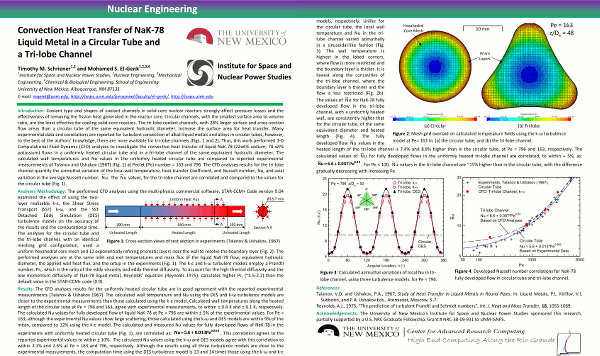- El-Genk, M.S., T.M. Schriener, K. Kresl-Hotz, Simulation of Liquid Mixing and Stratification in Upper Plenum of Pool-Type Sodium Fast Reactors Following Sudden Decrease in Power or Scram. J. Nuclear Technology, 2026. 1-28
- El-Genk, M.S., T. Schriener, Lightweight Heat Pipe Radiator for Nuclear Reactor Power Systems on Lunar Surface. J. Nuclear Technology, 2025. 211(3) 400-428
- Kresl-Hotz, K.R., El-Genk, M.S., Schriener, T.M., Numerical Mesh Refinement for Flow Mixing in Pool Type SFR. Proceedings ANS Student Conference 2025, 2025.
- Kresl-Hotz, K.R., El-Genk, M.S., Schriener, T.M., CFD Analyses of the Flow Mixing and Stratification in Pool Type SFR. Proceedings ANS Student Conference 2025, 2025.
- Schriener T.M., M.S. El-Genk, Armoring Lightweight Foldable Radiator Panel for Lunar Surface Fission Power Systems. J. Nuclear Technology, 2025. 1-25
- Schriener T.M., M.S. El-Genk, Launch Solid Stress Analyses of Ultra-Light Heat Rejection Radiator Module and Panel for Lunar Fission Surface Power. J. British Interplanetary Society, 2025. 78(3) 74-83
- El-Genk, M.S., T.M. Schriener, A.N. Shaheen, Machine-Learning Algorithms for Remote-Control and Autonomous Operation of the Very-Small, Long-Life, Modular (VSLLIM) Microreactor. J. Nuclear Engineering, 2025. 6(4) 54
- El-Genk, M.S., T.M. Schriener, Lightweight Heat Pipe Radiator for Nuclear Reactor Power Systems on Lunar Surface. Nuclear Technology, 2024. 1-29
- Schriener, T.M., M.S. El-Genk, Armored Lightweight Heat Rejection Radiator for Lunar Surface Nuclear Reactor Power Systems. Proceedings ANS 2024 Nuclear and Emerging technologies for Space (NETS 2024), 2024.
- El-Genk, M.S., T. Schriener, Lightweight Heat Pipe Radiator Panel for Lunar Surface Fission Power Systems. Proceedings AIAA ASCEND Conference, 2024.
ISNPS Director Mohamed El-Genk invited to be Panelist at Opening Plenary of 2024 ANS Winter Conference and Expo
12/4/2024
El-Genk invited speaker at the Open Plenary Panel at ANS Winter Meeting, 17-21, 2024
12/9/2024
Masters Graduation - Ahmad Shaheen
Ferris Engineering Center
Room 1120
Mailing Address:
Institute for Space & Nuclear Power Studies
MSC01-1120
1 University of New Mexico
Albuquerque, NM 87131
Phone: 505.277.5442
Fax: 505.277.5433
Online: Contact Form
ISNPS News
[09 - 12 - 2025] Seniors in the in the Nuclear Engineering Department visit the UNM-ISNPS Lab
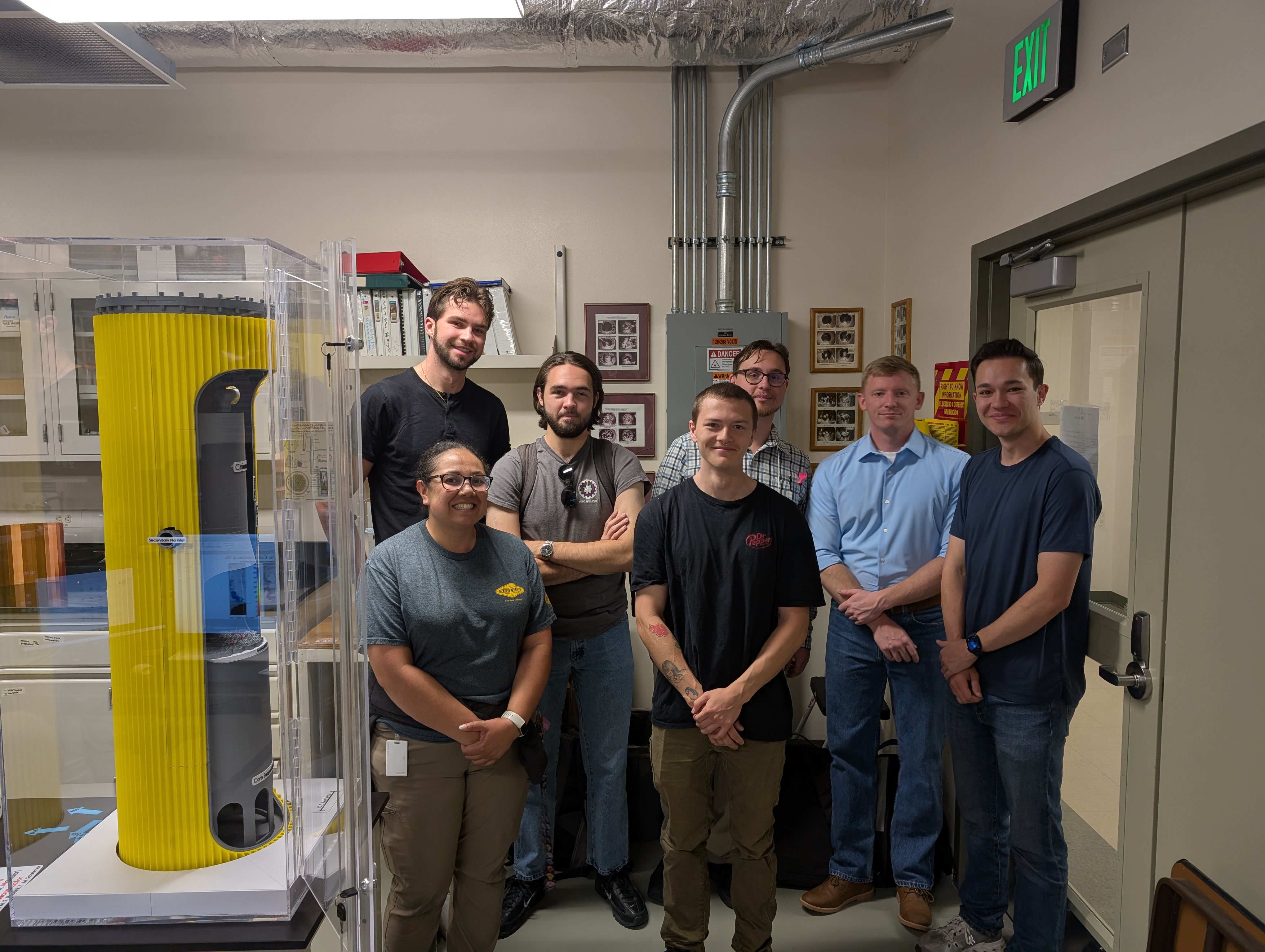
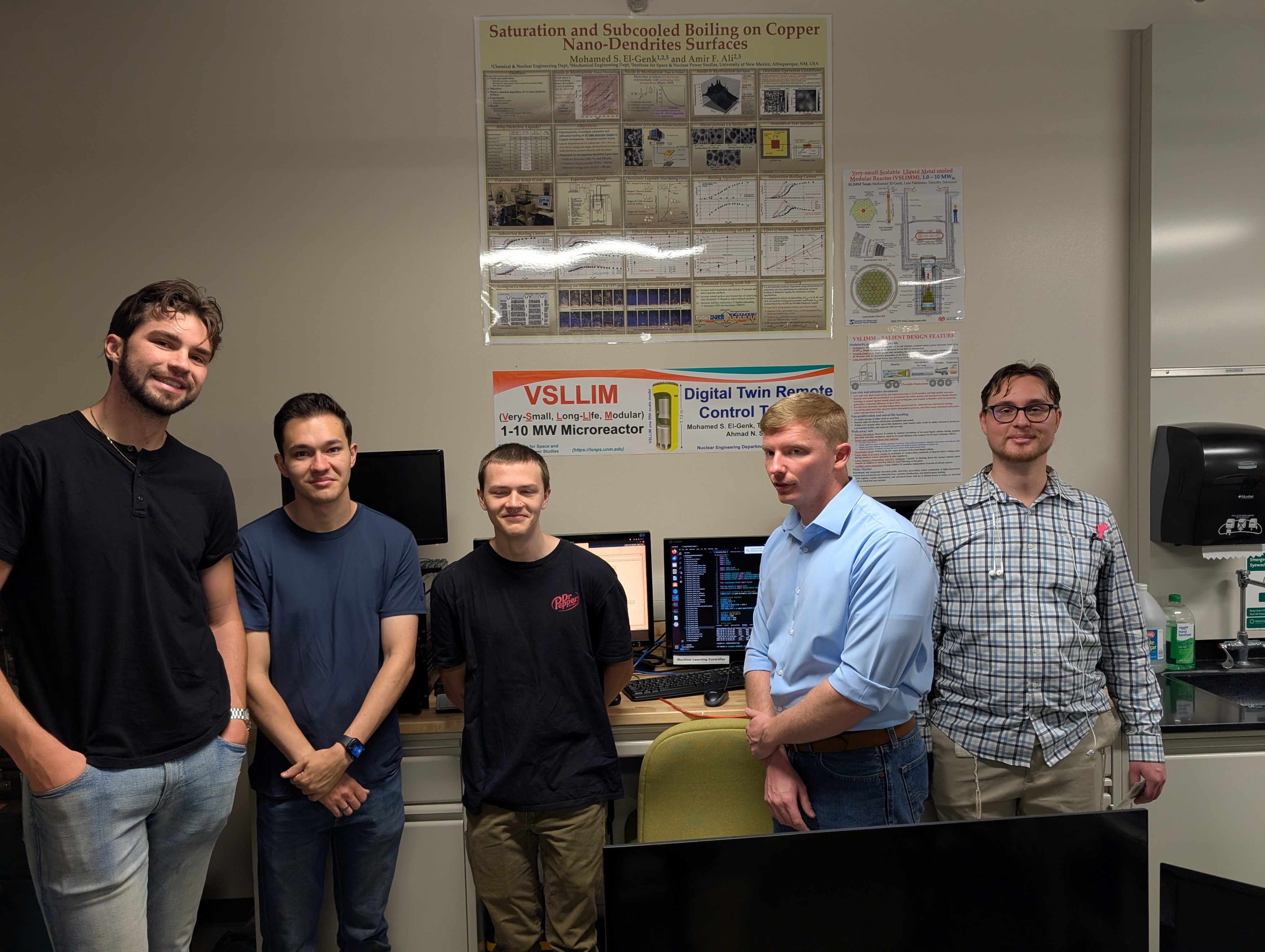
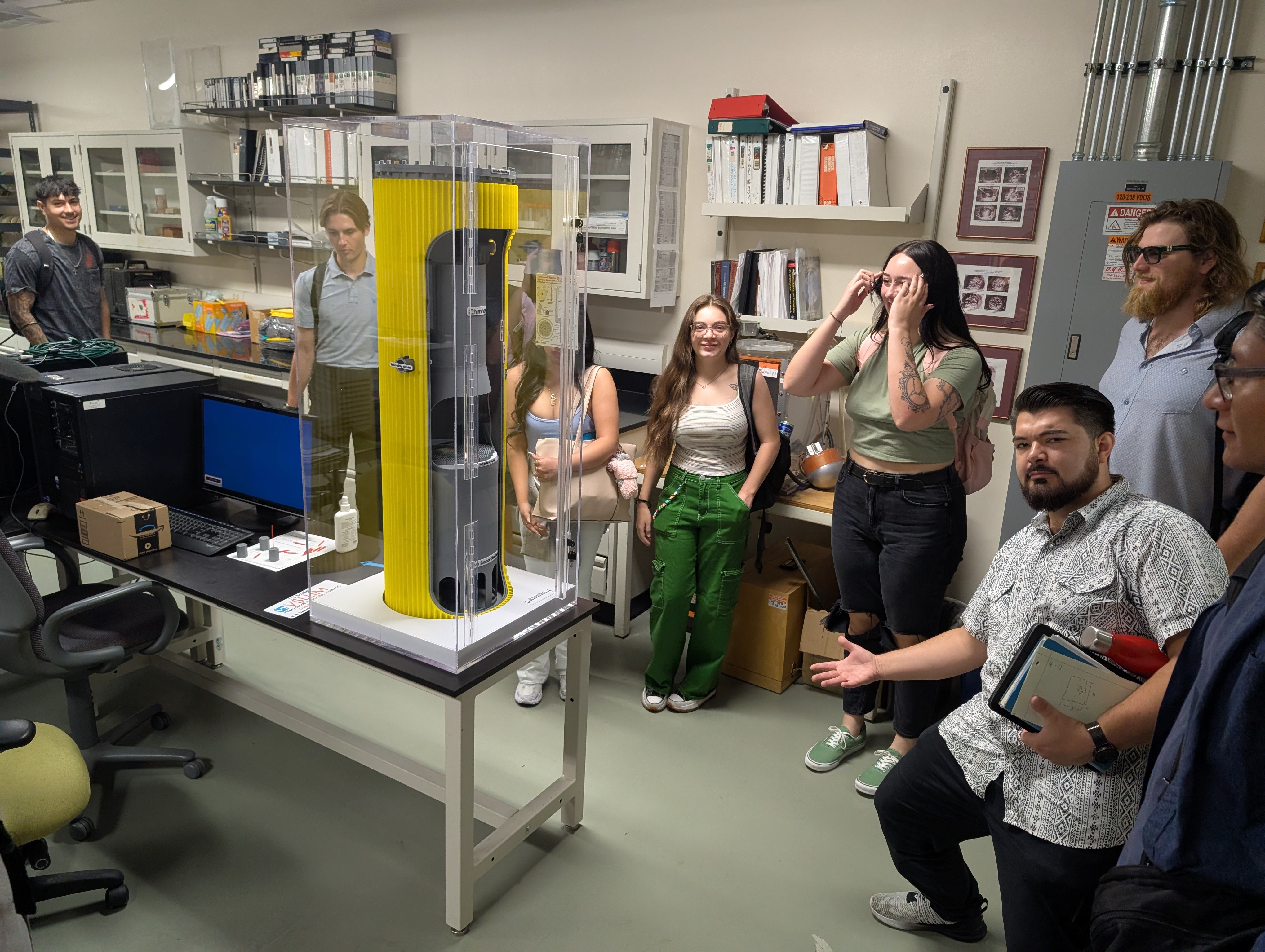
Nuclear Engineering seniors at the University of New Mexico visited the ISNPS Thermal-Hydraulics Lab B136 in the basement of Centennial Engineering building to learn about Modular Microreactor research being done at ISNPS. They viewed and inspected the 1:5 scale model of the developed invention of the fully passive, walk away safe, fast spectrum, sodium cooled VSLLIM (Very Small Long-Life Micro) reactor. It can be deployed with the entire power plant on an 18-wheeler truck, a railcar, or a barge. The plant would generate both heat and electricity for remote communities, military bases in desert and cold areas, and remote mining operations. The VSLLIM plant employs open air Brayton Cycle Engines to convert the reactor heat to electricity at an efficiency > 40%. It operates fully passive, requires no water cooling and can generate 1.0 to 10 MW of thermal power continuously for > 90 yr and > 6 yr, respectively. VSLLIM modular micro reactor design and associated IP disclosures have been licensed by the UNM Rainforest Innovation to Eagle Energy ( https://https://eagleenergymetals.com/ ) for commercial development, deployment, and marketing.
[04 - 17 - 2025] ISNPS Graduate Student Keenan Kresl-Hotz Awarded for Presentation at ANS 2025 Student Conference
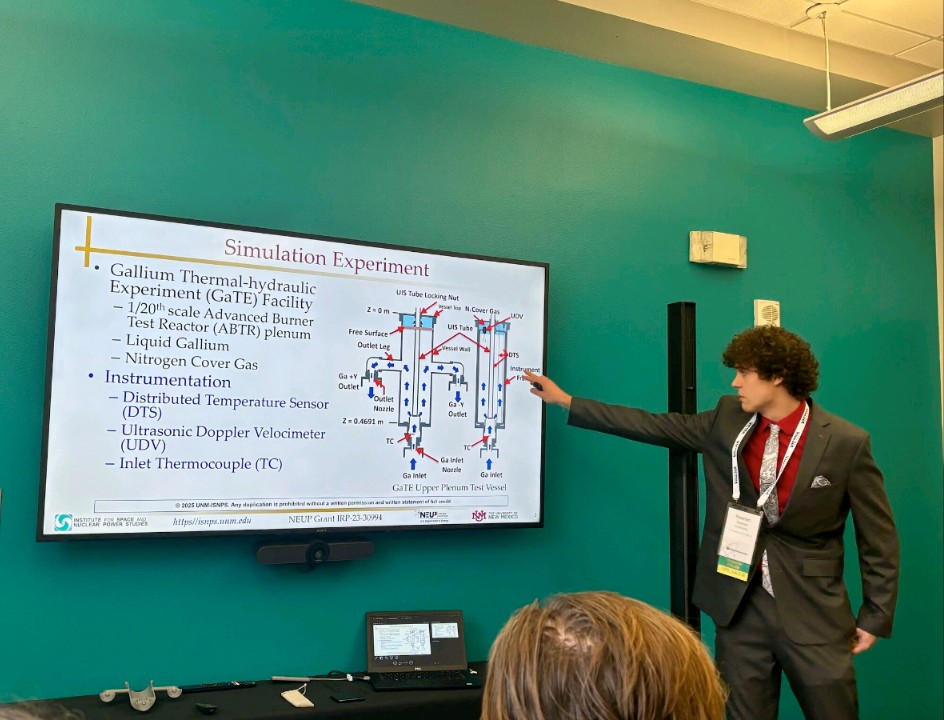
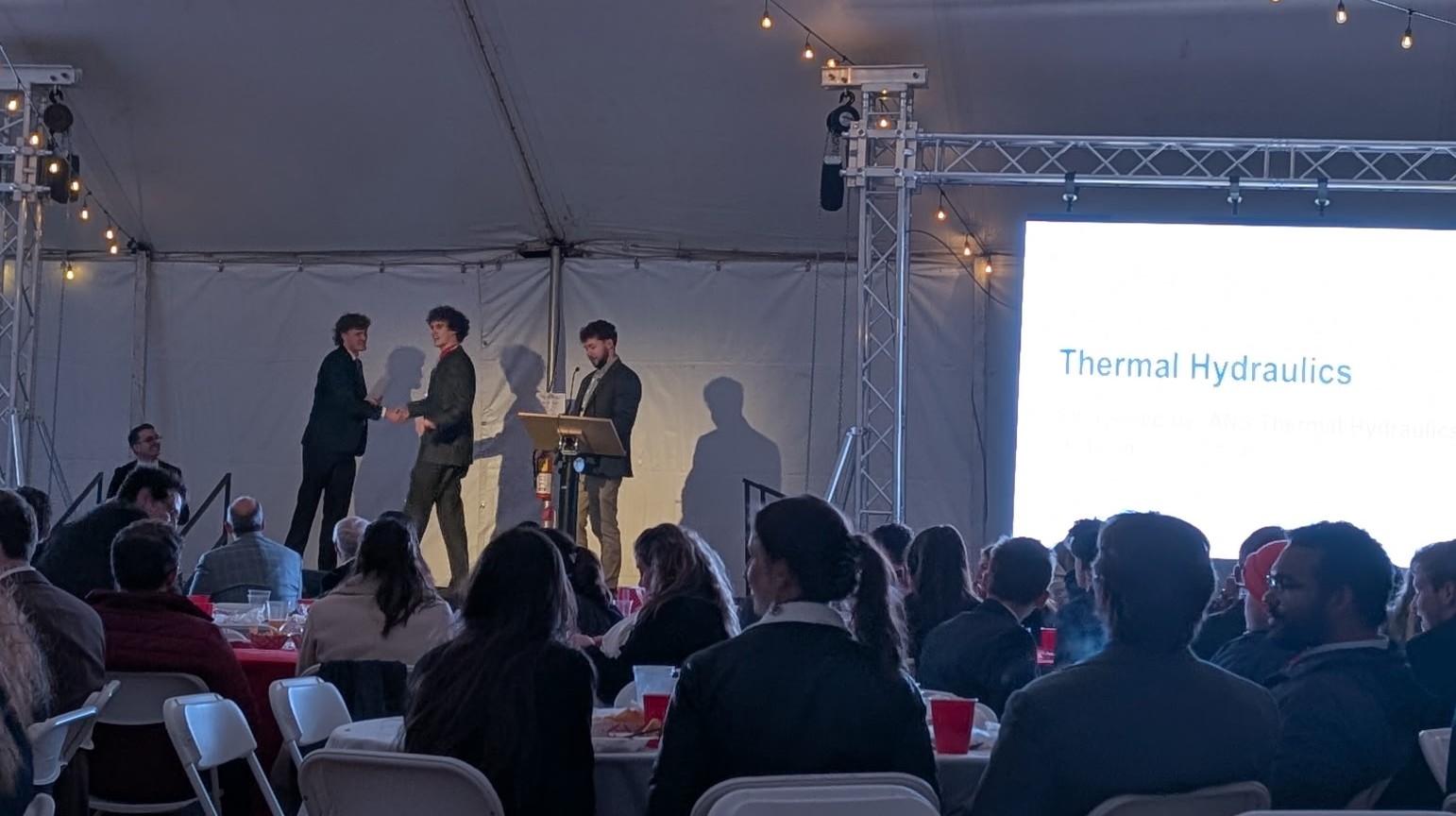
During the 2025 American Nuclear Society Student Conference hosted by the University of New Mexico (UNM) in Albuquerque, NM April 3-5, Keenan Kresl-Hotz a graduate research assistant with UNM's Institute for Space and Nuclear Power Studies (ISNPS) and NE department received the best graduate student presentation award in the Thermal-Hydraulics track. Keenan's presentation "CFD Analyses of the Flow Mixing and Stratification in Pool Type SFR" discussed computational fluid dynamics (CFD) simulation of liquid gallium flow mixing in experiments performed at Purdue University. The experiments examined flow mixing in an upper plenum geometry for pool-type sodium fast reactors. The presented work, performed with Distinguished and Regents' Professor Mohamed S. El-Genk and Research Associate Professor Timothy Schriener, investigated the effects of the liquid gallium inlet velocity on the intensity of flow mixing within the experimental plenum vessel using Large Eddy Simulation (LES) CFD simulations using the STAR-CCM+ Multiphysics commercial CFD. The calculated time average flow velocities agreed with the reported experimental measurements.
This work is part of a current DOE IRP project "Exascale Simulation of Thermal-hydraulics Phenomena in Advanced Reactors and Validation using High Resolution Experimental Data" lead by City College of New York, in collaboration with UNM-ISNPS, Purdue University, and Argonne National Laboratory. This project objective to investigate the effectiveness of using large scale CFD simulations to model thermal-hydraulic experiments investigating phenomena of interest to the safety of advanced liquid metal cooled fast reactors and high temperature gas-cooled reactors. The obtained CFD simulation results using the STAR-CCM+ commercial code will be compared to those of CFD simulations conducted using the nekRS CFD code under development at Argonne National Laboratory and reported experiment measurements. Another objective of this DOE NEUP-IRP award is to provide education and training opportunities for students at the collaborating universities.
The abstracts can be accessed at ( https://isnps.unm.edu/publications/abstracts/ANS_9440-paper.pdf ) and ( https://isnps.unm.edu/publications/abstracts/ANS_9466-paper.pdf )
[02 - 01 - 2025] UNM alumni Dr. James Gover presents on bridging the gap between engineering and public policy to UNM Nuclear Engineering Department
Dr. James Gover visited the UNM NE Department to discuss his experiences on engaging with federal and state legislators in policy development. His talk discussed his past successes and failures and the lessons current and future engineers could take to try to help shape a vibrant nuclear future for New Mexico and the United States. Dr. Gover encouraged the graduate students in attendance to reach out and contact their state representatives and the governor to become engaged to share their voice on nuclear energy and technologies future role for New Mexico.
Dr. Gover worked at Sandia National Laboratories for 35 years, where he worked on radiation effects, firing set development and policy research. He was a professor and chair of the Electrical and Computer Engineering Department at Kettering University for 13 years. He is currently self-employed and conducts economic development research. He is the recipient of several awards and honors from the Institute of Electrical and Electronic Engineers (IEEE), including as a Life Fellow IEEE studying radiation effects in nuclear systems, IEEE-USA Congressional Fellow, IEEE-USA Committee Competitiveness Fellow, and more.
[12 - 09 - 2024] Masters Graduation - Ahmad Shaheen
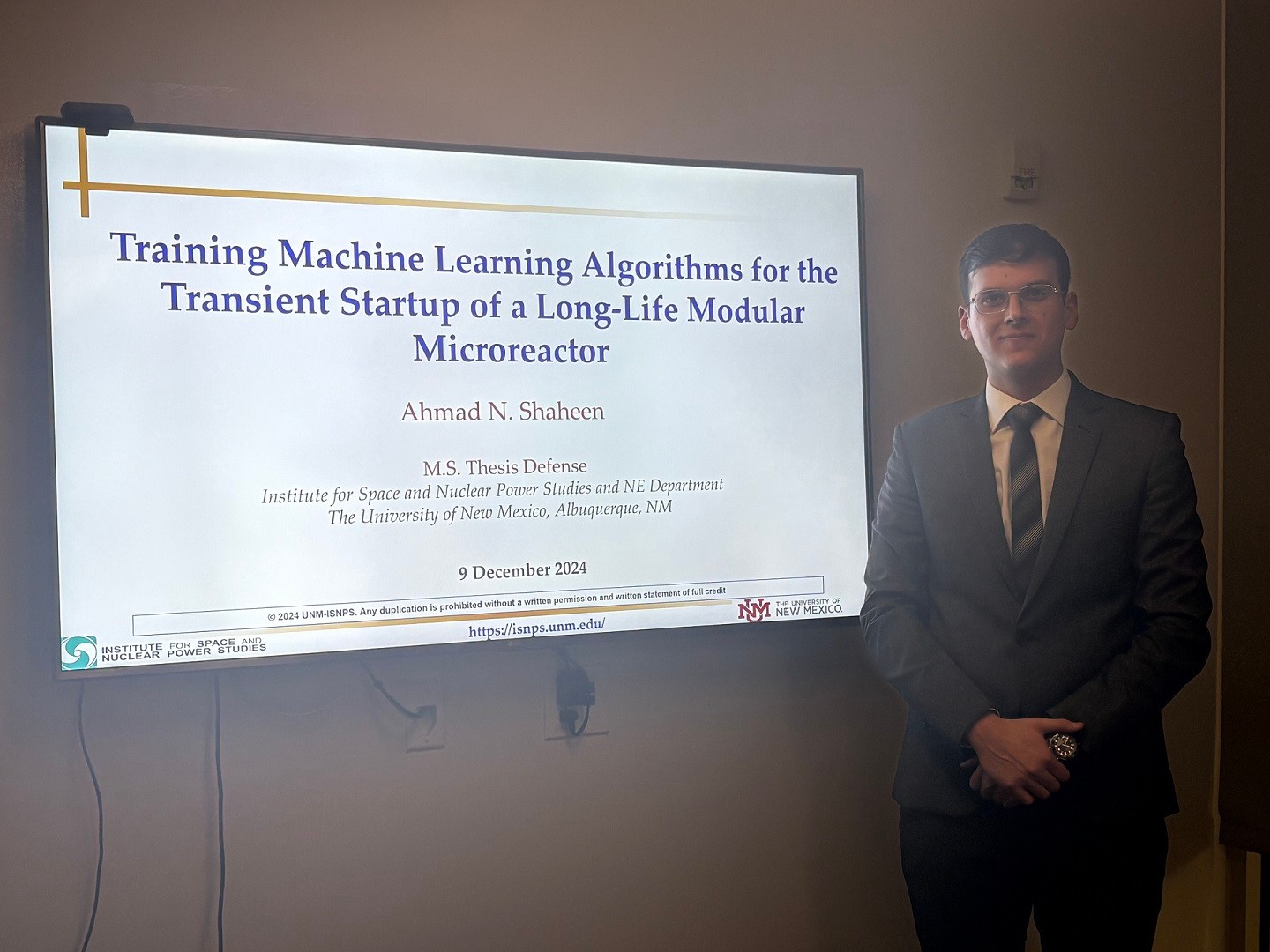
ISNPS student Ahmad Shaheen graduated with a M.S. degree in Nuclear Engineering at the University of New Mexico. His advisor was Dr. Mohamed S. El-Genk, Distinguished and Regents' Professor of Nuclear, Mechanical, and Chemical and Biological Engineering and Founding Director of the Institute for Space and Nuclear Power Studies (ISNPS). Ahmad's thesis, titled Training Machine Learning Algorithms for the Transient Startup of a Long-Life Modular Microreactor, encompassed his research using Machine Learning (ML) algorithms within the Supervised Learning (SL) and Reinforcement Learning (RL) paradigms to train artificial neural networks to manage the movement of the control rods in the Very-Small, Long-LIfe, Modular (VSLLIM) microreactor developed at the University of New Mexico's Institute for Space and Nuclear Power Studies (UNM-ISNPS). The trained neural networks attempt to predict the positions of the control rods for a smooth startup to nominal, full-power steady state condition. The research successfully demonstrated training neural networks using the Soft Actor Critic (SAC) RL algorithm for control of the VSLLIM microreactor during startup. This work was performed as part of a DOE Nuclear Engineering University Program project led by Purdue University collaborating with UNM-ISNPS to investigate methods for autonomous and remote control of microreactors.
[12 - 04 - 2024] El-Genk invited speaker at the Open Plenary Panel at ANS Winter Meeting, 17-21, 2024.
Distinguished and Regents' Professor of Nuclear Engineering and the founding Director of the Institute for Space and Nuclear Power Studies ( https://isnps.unm.edu/ ) has been an invited speaker at the Open Plenary Panel of the American Nuclear Society's Winter Meeting and Expo ( https://www.ans.org/meetings/wc2024/ ) held in Orlando, FL, 17 - 21, 2024. He delivered a talk entitled, "Nuclear Power: Projected Growth and Futurities," reviewing the status and potential growth of nuclear power for space exploration and planetary missions and for providing clean baseload and environmentally friendly energy option for meeting the projected phenomenal growth in electricity demand to power Data Center in the US and abroad. In COP28 in Dubai, UAE ( https://unfccc.int/cop28 ) and COP29 ( https://unfccc.int/cop29 ) in Baku, Azerbaijan, 31 Countries and > 120 companies signed a joint statement to TRIPLE global nuclear energy capacity by 2050, in the drive to cut greenhouse gas emissions. El-Genk also highlighted the recent and future increased demand for Small Modular Reactors (SMRs) and Modular Micro Reactors (MMRs) for baseload power supply for Data Centers, and remote communities and mining activities in the US and abroad. He concluded with a vision and recommendations future actions to support the projected growth in nuclear power in the US and for the US nuclear Industry to claim a global market share of nuclear energy growth in developing countries and underdeveloped counties in Europe, Africa, and Asia. He also highlighted the designs features of developed designs of the walk-away safe and passively operating SLIMM-SMR and VSLLIM-MMR developed at the University of New Mexico's Institute for Space and Nuclear Power Studies for long operation lives with no onsite storage of either fresh or spent nuclear fuel. These reactor designs passively respectively generate 10-100 MW and 1.0- 10 MW of thermal power for electricity generation and for providing thermal power at up to 800 K to a host of industrial applications and remote mining operations in arid and remote locations. ( https://isnps.unm.edu/publications/topic/slimm_reactor_concept/ ) They will be fully constructed, assembled and sealed in factory delivered on a portable platform or installed below ground and mounted in seismic insulation bearings at selected sites.
[10 - 04 - 2024] Distinguished and Regent's Professor and ISNPS Director Mohamed El-Genk invited to be Panelist at Opening Plenary of 2024 ANS Winter Conference and Expo
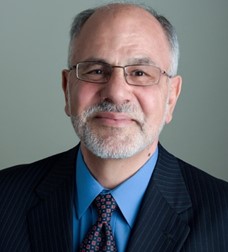
The American Nuclear Society (ANS) has invited Distinguished and Regent's Professor and founding director Mohamed El-Genk to be a panelist in the Opening Plenary of the 2024 ANS Winter Meeting and Expo to be held in Orlando, Florida November 18, 2024. The theme of the conference is "Now comes the hard part...." with talks focusing on the challenges nuclear faces with the development and deployment of the next generation of nuclear plants for clean energy generation on Earth and for space exploration
[04 - 04 - 2024] Graduate Research Assistantships are Available Summer and Fall 2024 in Space Nuclear Power, Reactor Thermal-Hydraulics, High Performance Computing and Computational Fluid Dynamics, and ML and AI Methods and Applications to Nuclear Reactor's Autonomous Operation
The Institute for Space and Nuclear Power Studies (ISNPS) at the University of New Mexico (UNM) is seeking applicants for multiple open Research Assistantship positions for starting the Summer and Fall 2024 Fall semester for full-time graduate students in Nuclear Engineering or closely related fields with relevant experience in the one of more of the listed areas to participate in cutting-edge engineering research. We are seeking students with diverse skillsets for exciting research projects in the areas of: Computational fluid dynamics (CFD) and thermal-hydraulic analysis methods of energy systems; Small modular and microreactors design and modeling; Control theory and Machine Learning and AI methods and their applications to autonomous control and operation of microreactors, data mining, and training digital control systems; Computer programing and transient modeling using MATLAB Simulink; Operation, modeling, and analysis of heat pipes and thermal analysis for space nuclear power applications.
Applicants are being sought with prior research experience, and an earned MS degree in nuclear, chemical, mechanical engineering, or closely related fields. Those from minorities and traditionally underrepresented groups are strongly encouraged to apply. These positions have the potential of multi-year financial support and the opportunity to participate in cutting edge research essential to the future of advanced, small modular and micro-reactors and for space exploration.
Additional information on these opportunities can be found at https://isnps.unm.edu/opportunities/.
[10 - 19 - 2023] Alumni of UNM-ISNPS and Nuclear Engineering Department Selected Scientist of the year
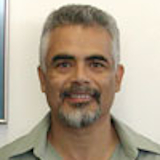
Sal Rodriguez, alumni of ISNPS and the Nuclear Engineering Department of UNM has been selected as the 2023 Scientist of the Year by the Hispanic Engineer National Achievement Awards Conference. He is the first Sandia employee so named. ISNPS congratulates Sal on this great and well deserved honor. Please see the Sandia National Laboratories press release for more on this exciting announcement Here
[10 - 17 - 2023] Researcher at UNM-ISNPS promoted to an Associate Research Professor
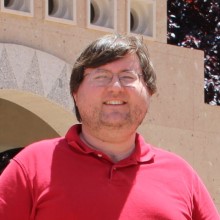
Dr. Timothy Schriener, an accomplished researcher at the University of New Mexico's Institute for Space and Nuclear Power Studies (UNM-ISNPS) has been promoted to the rank of Research Associate Professor in the Department of Nuclear Engineering. Dr. Schriener has been with the Institute for Space and Nuclear Power Studies since 2016 working closely with the founding Director Distinguished and Regents Professor Mohamed S. El-Genk and graduate students on cutting-edge research funded by awards and grants from NASA, the Department of Energy, industry, and Idaho National Laboratory that is managed by Battelle Energy Alliance in the diverse areas. These include space nuclear power, radioisotope power systems, alkali and heavy liquid metals technology, miniature submersible pumping options on alkali metals and molten; neutronics and computational fluid dynamics methods and application to the design, thermal-hydraulics and safety analyses of small modular and micro nuclear reactors, radiation shield, modeling and simulation of the transient operation of low and high temperature heat pipes including the startup from a frozen state, and cybersecurity of nuclear reactor systems. He is currently a Co-PI on multiple funded awards. These include a DOE Nuclear Engineering University Program (NEUP) project with Purdue University investigating the development and application of AI and ML methods to the autonomous control of microreactors, a NASA Early Stages Innovation grant to develop an innovative lightweight heat pipe radiator panel concept for waste heat rejection of nuclear reactor systems for space exploration and lunar surface power, and a DOE Integrated Research Project (IRP) with City College of New York, Purdue University and Argonne National Laboratory to develop and investigate advanced computational fluid dynamics capabilities for thermal-hydraulics and safety analyses of advanced GEN-IV sodium fast reactors and very high temperature helium cooled reactors. He is a widely published researcher and works closely with graduate and undergraduate students at UNM-ISNPS to train them on the development, use, and application of nuclear reactorsí modeling and simulation methods to ongoing research at UNM-ISNPS.
[08 - 14 - 2023] Graduate Research Assistantships Available Fall 2023 in Space Nuclear Power, Reactor Thermal-Hydraulics, High Performance Computing and Computational Fluid Dynamics, and ML and AI Methods and Applications to Nuclear Reactors Autonomous Operation and Remote control
The Institute for Space and Nuclear Power Studies (ISNPS) at the University of New Mexico (UNM) is seeking applicants for multiple open Research Assistantship positions starting in the 2023 Fall semester for full-time graduate students in Nuclear Engineering or closely related fields. We are seeking students with diverse skillsets in modeling and simulation for exciting research projects in the areas of secure remote operation and control and cybersecurity for nuclear power plants, the development of lightweight heat rejection heat pipes radiator for future space nuclear power and propulsion systems, and Computational Fluid Dynamics (CFD) and thermal-hydraulic analysis for advanced nuclear reactors. Preference will be given to qualified applicants with prior research experience, and an earned MS degree in nuclear, chemical, mechanical engineering, or closely related fields. Those from minorities and traditionally underrepresented groups are strongly encouraged to apply. These positions have the potential of multi-year financial support and the opportunity to participate in cutting edge research essential to the future of advanced, small modular and micro-reactors and for space exploration.
Additional information on these opportunities can be found at http://isnps.unm.edu/opportunities/.
[06 - 05 - 2023] Doctoral Graduation - Ragai Altamimi
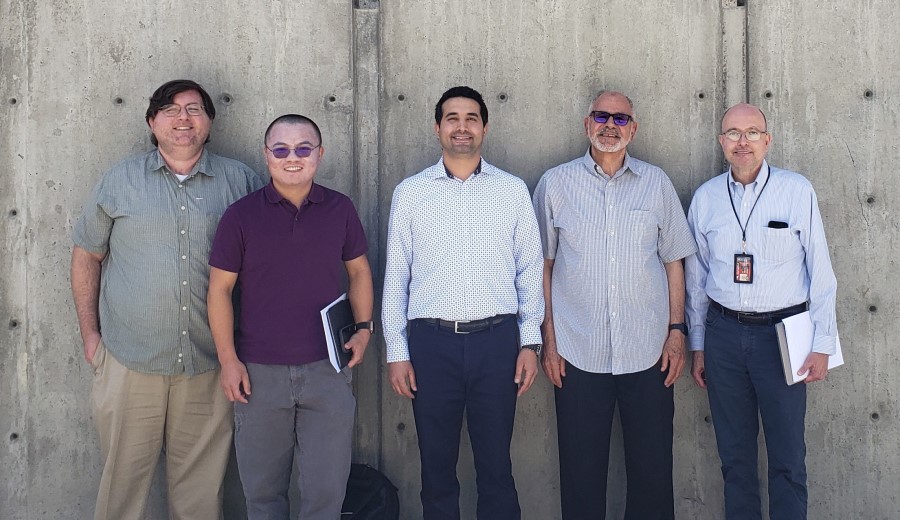
ISNPS student Ragai Altamimi graduated with a Ph.D degree in Nuclear Engineering at the University of New Mexico. His advisor was Dr. Mohamed S. El-Genk, Distinguished and Regents' Professor of Nuclear, Mechanical, and Chemical and Biological Engineering and Founding Director of the Institute for Space and Nuclear Power Studies (ISNPS). Pictured are Ragai with his committee (from left to right: Dr. Timothy Schriener, Dr. Minghui Chen, Dr. Ragai Altamimi, Dr. Mohamed El-Genk, and Dr. Edl Schamiloglu). The focus of Ragai's research was to develop designs and conduct performance analyses of miniature, submersible electromagnetic pumps in in-pile and out-of-pile test loops for supporting the current development of Gen-IV molten Pb and liquid Na fast neutron spectrum terrestrial nuclear reactors. He investigated two electromagnetic pump options; a Direct Current-ElectroMagnetic pump (DC-EMP) and an Alternating Linear Induction Pump (ALIP). Ragai developed improved equivalent circuit models for the analysis of DC-EMPs and ALIP, and conducted 3-D Magnetohydrodynamic (MHD) numerical analyses of the DC-EMP design using the multiphysics code STAR-CCM+.
[01 - 17 - 2023] UNM, Purdue work to develop validated physics-based machine learning autonomous control architecture for microreactors
Distinguished and Regents' Professor Mohamed El-Genk and Research Assistant Professor Timothy Schriener have begun a three year research project titled "Demonstrating Autonomous Control, Remote Operation, and Human Factors for Microreactors under Prototypic Conditions in PUR-1." UNM-ISNPS are collaborating on the Purdue University-led project along with Curtiss-Wright Nuclear Division and Argonne National Laboratory. For the three-year project, the collaborative team will develop a validated, physics-based, machine-learning, autonomous-control architecture for the UNM Very Small, Long-Life Modular (VSLLIM), a liquid sodium, natural circulation-cooled microreactor, as well as demonstrate its application for remotely operating and controlling the PUR-1 research reactor at Purdue University. The award will offer minority undergraduates and graduate students at Purdue and UNM the opportunity to participate in the research activities and conduct portions at Argonne National Laboratory.
You can read the UNM news room release here: UNM News Room Release
[11 - 25 - 2022] First Year Progress Report for NASA Grant to Develop Advanced Lightweight Heat Rejection Radiators for Space Nuclear Power and Propulsion Systems
The Institute for Space and Nuclear Power Studies (ISNPS) at the University of New Mexico (UNM) has released the first year progress report for a NASA Early Stage Innovation project to develop and optimize the design and demonstrate the performance of an innovative lightweight heat pipes radiator for operating at 500 - 600 K with redundant and resilient functionality and an aerial density ~1/3 current State of the Art. The research team at UNM-ISNPS and Nuclear Engineering Department is led by Mohamed El-Genk (PI), Distinguished and Regents' Professor and founding Director, and includes Research Assistant Professor Timothy Schriener (Co-PI) and Assistant Professor Osman Anderoglu (Co-PI) as well as NE graduate student Christopher Wolfe. The report summarizes the first year progress towards the project objectives of (a) developing and optimizing the design of an advanced lightweight heat pipes radiator panel concept using thermal and structural modeling and simulation analyses, and (b) investigating methods of diffusion bonding and characterize interfaces for the HOPG/Ti/C-C and Ti/C-C composite structures. The NASA ESI project has been renewed for a second year with more exciting research opportunities in developing this key technology for future exploration of the Moon, Mars, and deep space
[09 - 30 - 2022] Final Report for UNM-ISNPS/SNL DOE-NEUP Collaboration on Cybersecurity for Nuclear Plant Instrumentation and Control Systems
UNM-ISNPS in collaboration with Sandia National Laboratories has released the final project report on the effort to develop a Nuclear Instrumentation and Control Simulation (NICSim) platform to aid in investigating the cybersecurity of nuclear power plant instrumentation and control systems. This work was supported by a multi-year DOE Nuclear Engineering University Program (DOE NEUP) grant. This progress report, titled NICSim: Nuclear Instrumentation and Control Simulation for Modeling Cyber-Attacks, summarizes the main findings and accomplishments from this innovative research effort developing the LOBO Nuclear CyberSecurity (LOBO NCS) platform. This platform links emulated PLCs in the I&C systems of a representative Pressurized Water Reactor (PWR) plant to Matlab Simulink physics-based, dynamic models of the integrated plant and components. The report also presents results of using the LOBO NCS platform to simulate cyber-attacks on the digital I&C system of a representative PWR plant and for the control system of a space nuclear reactor power system with multiple CBC loops. The LOBO NCS platform will support future ISNPS research efforts related to developing and testing advanced control concepts for microreactors and space nuclear power systems. The final report along with all six milestone reports submitted to DOE NEUP are available under http://isnps.unm.edu/reports/.
Final Report: NICSim: Nuclear Instrumentation and Control Simulation for Modeling Cyber-Attacks
Task 5 Milestone Report: Integration and Characterization Testing of the LOBO Nuclear CyberSecurity (LOBO NCS) Platform and OpenPLC
[07 - 06 - 2022] UNM-ISNPS Part of DOE Nuclear Energy University Program Grant
Distinguished and Regents' Professor Mohamed El-Genk and Research Assistant Professor Timothy Schriener received DOE NEUP funding for the project titled "Demonstrating Autonomous Control, Remote Operation, and Human Factors for Microreactors Under Prototypic Conditions in PUR-1." UNM-ISNPS are collaborating on the Purdue University-led project along with Curtiss-Wright Nuclear Division and Argonne National Lab. This research builds on UNM-ISNPS's expertise on modeling and simulation of nuclear power plants and digital I&C systems.
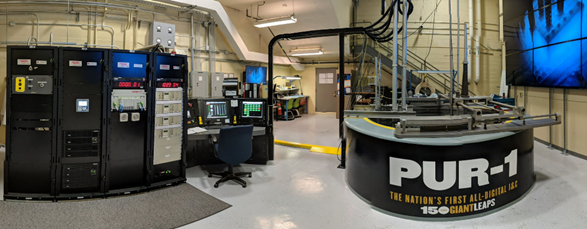
You can read the UNM press release here: UNM Press Release
[02 - 04 - 2022] UNM-ISNPS Receives NASA Grant to Develop Advanced Lightweight Heat Rejection Radiators for Space Nuclear Power and Propulsion Systems
The Institute for Space and Nuclear Power Studies (ISNPS) at the University of New Mexico (UNM) is selected to receive a three-year NASA research grant for a total of $650,000. The grant expected to start in January 2022 will support the development of space nuclear reactor power and propulsion systems to enable NASA's future planetary exploration missions to the Moon, Mars and beyond. The research team at UNM-ISNPS and Nuclear Engineering Department is led by Mohamed El-Genk (PI), Distinguished and Regents' Professor and founding Director, and includes Research Assistant Professor Timothy Schriener (Co-PI) and Assistant Professor Osman Anderoglu (Co-I). The research team will also include graduate and undergraduate students in the NE Department. The research effort aims to develop and optimize the design and demonstrate the performance of an innovative lightweight heat pipes radiator for operating at 500 - 600 K with redundant and resilient functionality and an aerial density ~1/3 current SOA. The foldable radiator panels will employ integrated metal-graphite composite fins to enhance heat spreading and rejection into space. The lightweight and strong C-C composite armor will protect the radiator panels against damage by impacts of space debris and micro meteoroids. The headers for circulating the primary liquid metal coolant in the panels will employ perforated dividers with optimized orifices for reducing the required pumping power.
UNM Press Release - Shooting for the moon: UNM receives NASA Early Stage Innovation Award
[12 - 06 - 2021] Graduate Research Assistantships in Space Nuclear Power, Nuclear Cybersecurity, Micro Reactors' Neutronics, Thermal-Hydraulics, and Autonomous Operation and Remote Control
The Institute for Space and Nuclear Power Studies (ISNPS) at the University of New Mexico (UNM) is seeking applicants for a number of open Research Assistantship positions starting in the 2022 summer semester for full-time graduate students with MS or BS degrees in Nuclear Engineering or closely related fields. We are seeking students with diverse skillsets in modeling and simulation and experimental work for an exciting research project to develop lightweight heat rejection heat pipes radiator for future space nuclear power and propulsion systems. Applicants are also being sought with experience in areas such as controls, machine learning, security, and programming for projects in the areas of secure remote operation and control and cybersecurity for nuclear power plants. These positions have the potential of multi-year financial support and the opportunity to participate in cutting edge research essential to future of space exploration and the deployment of future small modular and micro-reactors.
Additional information on these opportunities can be found at http://isnps.unm.edu/opportunities/.
[11 - 15 - 2021] El-Genk receives American Nuclear Society Reactor Technology Award
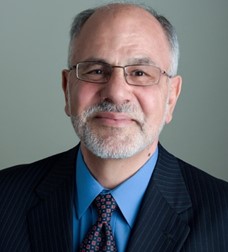
Mohamed S. El-Genk, Distinguished and Regents' Professor of Nuclear, Mechanical and Chemical & Biological Engineering and the founding Director of the Institute for Space and Nuclear Power Studies has been selected to recieve the 2021 American Nuclear Society Reactor Technology Award. ANS gives this award in recogniotion to individuals who have made original and outstanding contributions to the advancement in the areas of design and safety in reactor technology. Professor El Genk has been presented this award in recognition for his extraordinary contributions toward advancing space and microreactor technologies. He will be recogized during the 2021 ANS Winter Meeting in Washington, DC on December 1.
"This is for my students and members of the research staff at the UNM Institute for Space and Nuclear Power Studies over the years. It would not have been possible without their dedication, innovation and hard work. It has been a challenging and enjoyable journey, indeed." - Professor El-Genk
[05 - 24 - 2021] Congratulations to Ragai Altamimi

Ragai Altamimi, a member of the research team at the University of New Mexico's Institute for Space and Nuclear Power Studies (UNM-ISNPS), and PhD candidate in Nuclear Engineering Department, successfully defended his PhD Dissertation proposal in Nuclear Engineering before the faculty committee on studies on 5 May 2021. The proposed Dissertation title is "Designs and Performance Analyses of Compact Electromagnetic Pumps for Nuclear Reactors and Industrial Applications." The proposed research aims to develop and analyze performance of compact designs of Annular Linear Induction Pumps (ALIP) and Direct Current-Electromagnet (DC-EM) conduction pumps of small footprints, for pumping alkali and heavy metal coolants at high operating temperatures. The research results will contribute to future development and passive safety of alkali and heavy metals cooled space and terrestrial small and micro nuclear reactors. Members of Ragai's PhD dissertation Committee on studies are Dr. Minghui Chen, Assistant Professor of Nuclear Engineering, Dr. Mohamed El-Genk (Chair), Distinguished and Regents' Professor of Nuclear Engineering and Founding Director of UNM-ISNPS, Dr. Edl Schamiloglu, Distinguished Professor of Electrical and Computer Engineering and Associate Dean of Research, School of Engineering, and Dr. Timothy Schriener, Assistant Research Professor in UNM-ISNPS and Nuclear Engineering Department.
[11 - 05 - 2020] Third Progress Report for UNM-ISNPS/SNL DOE-NEUP Collaboration on Cybersecurity for Nuclear Plant Instrumentation and Control Systems
UNM-ISNPS in collaboration with Sandia National Laboratories has released the latest progress report on the effort to develop a Nuclear Instrumentation and Control Simulation (NICSim) platform to aid in investigating the cybersecurity of nuclear power plant instrumentation and control systems. This work is supported by a multi-year DOE Nuclear Engineering University Program grant. This progress report, titled Emulated Programmable Logic Controllers for the Protection and Safety Monitoring and Operation I&C Systems in a Representative PWR Plant for Cybersecurity Applications presents the results of the research effort developing an emulated Instrumentation and Control (I&C) system for the physics-based PWR model in the NICSim platform, including the Programable Logic Controllers (PLCs) in the operation and safety I&C systems. The report details the functional programing and testing for the different PLCs when coupled to the developed PWR plant model.
[11 - 05 - 2020] UNM-ISNPS Research of Pump Design Effort for Extended Length Test Assembly for Lead Coolant (ELTA-CL) for Planned Versatile Test Reactor
UNM-ISNPS has been working in a team lead by Los Alamos National Laboratory on investigating pumping options for circulating molten lead in the Extended Length Test Assembly for Lead Coolant (ELTA-CL) under conceptual development for the planned Versatile Test Reactor (VTR). The ELTA-CL will support the development of lead-cooled fast reactors by allowing corrosion testing of candidate materials in the VTR core irradiation environment, and by demonstrating potential fuel concepts and instrumentation options. This work is supported by a DOE grant from Battelle Energy Alliance. The research effort investigated four pumping options for circulating molten lead in the ELTA-CL: Annular Linear Induction Pump (ALIP), Direct Current Electromagnetic Pump (DC EMP), gas-lift pumping, and axial-centrifugal flow mechanical pump. Extensive design and performance analyses were conducted by UNM-ISNPS researches to determine the ability of each pumping option to meet desired ELTA-CL requirements.
[08 - 03 - 2020] Second Progress Report for UNM-ISNPS/SNL DOE-NEUP Collaboration on Cybersecurity for Nuclear Plant Instrumentation and Control Systems
UNM-ISNPS in collaboration with Sandia National Laboratories has released the latest progress report on the effort to develop a Nuclear Instrumentation and Control Simulation (NICSim) platform to aid in investigating the cybersecurity of nuclear power plant instrumentation and control systems. This work is supported by a multi-year DOE Nuclear Engineering University Program grant. This progress report, titled A Physics based, Dynamic Model of a Pressurized Water Reactor Plant with Programmable Logic Controllers for Cybersecurity Applications presents the results of the research effort developing a physics based PWR plant model within Matlab Simulink framework to be coupled with the emulated PLCs in the representative I&C system architecture in the NICSim platform. The report details the physics-based component models of the nuclear reactor, pressurizer, steam generator, reactor coolant pump, and primary loop, as well their validation testing and sample transient results.
[06 - 10 - 2020] UNM's Nuclear Engineering department and Institute for Space and Nuclear Power Studies makes a strong presence at national meeting
Two graduate students, Andrew Hahn and Ragai Altamimi, Research Assistant Professor Timothy Schriener, and Distinguished and Regents' Professor gave talks on the results of ongoing research on the development of a nuclear power plants Cyber Security platform at a dedicated technical session entitled, "Cyber Security for Nuclear Power Installation-II," at the first virtual national meeting of the American Nuclear Society this week, 8-11 June, 2020. The Nuclear Instrumentation and Control Simulation (NICSim) Platform for investigating cybersecurity risks to nuclear power plants, is being developed in collaboration with Dr. Christopher Lamb and his colleagues at Sandia National Laboratories. This effort is funded by a 3-year award from DOE Nuclear Engineering University Program (NEUP) to the UNM Institute for Space and Nuclear Power Studies.
1. Nuclear Instrumentation and Control Simulation (NICSim) Platform for Investigating Cybersecurity Risks
2. Programmable Logic Controller of a Pressurized Water Reactor Core Protection Calculator
3. Pressurizer Model and PLCs for Investigation of Cybersecurity of PWR Plants
4. Steam Generator Model and Controller for Cybersecurity Analyses of Digital I&C Systems in PWR Plants
[12 - 14 - 2019] Masters Graduation - Raymond Fasano
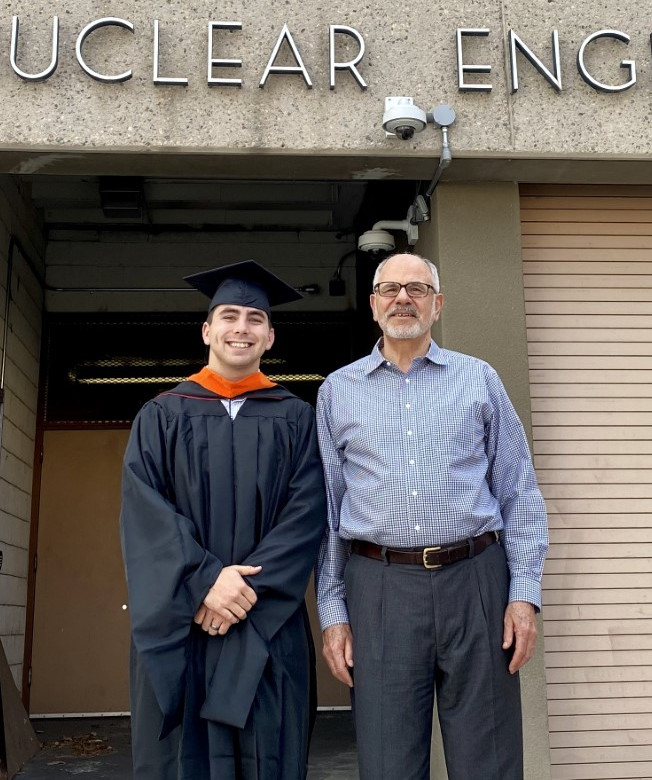
On December 14 2019, Ray Fasano graduated with a Master of Science degree in Nuclear Engineering at the University of New Mexico. His advisor was Dr. Mohamed S. El-Genk, Distinguished and Regents' Professor of Nuclear, Mechanical, and Chemical and Biological Engineering and Founding Director of the Institute for Space and Nuclear Power Studies (ISNPS). Ray worked on the NicSim NEUP project as a member of the ISNPS and as a graduate intern at Sandia National Laboratories (SNL). He worked closely with technical groups at SNL and UNM to ensure a productive collaboration. The focus of Ray's research focused on cybersecurity for nuclear power plants by developing an emulation platform for a pressurized water reactor. He also developed a PLC emulation methodology to provide a technical basis for using emulated PLCs in the NicSim platform. Upon graduating Ray will become a full-time member of the technical staff at SNL.
[11 - 27 - 2019] Graduate and Research Assistant positions available for 2020
The Institute for Space and Nuclear Power Studies has current openings available starting spring semester 2020 .
One opening is available for qualified graduate students in the fields of Nuclear Engineering, Electronics and Computer Engineering, Computer Science, or Mechanical Engineering to assist with exciting research in the area of nuclear cybersecurity.
A second opportunity is available for qualified students enrolled to pursue a Ph.D. degree in Mechanical Engineering, Nuclear Engineering, or Chemical Engineering to to conduct pool boiling experiments and Computational Fluids Dynamics (CFD) simulation and analysis of two-phase flow with applications to energy systems and submersion cooling of electronics.
Additional information on these opportunities can be found at http://isnps.unm.edu/opportunities/.
[08 - 31 - 2019] Forbes.com writes about ISNPS's SLIMM and VSLLIM reactor concepts
The Scalable LIquid Metal cooled small Modular (SLIMM) and Very Small, Long LIfe, Modular (VSLLIM) reactor concepts developed by ISNPS researchers are the focus of a recent piece on Forbes.com ( see article here). These passively safe reactor concepts are cooled by the natural circulation of liquid sodium, and are designed to scalable to different power levels (from 10-100 MWth for SLIMM and 1-10 MWth for VSLLIM). For publications discussing these innovative SMR and vSMR concepts see SLIMM and VSLLIM Publications
.[08 - 17 - 2019] ISNPS research highlighted at Sandia National Laboratories Cybersecurity Research Spotlight Forum
Distinguished and Regents' Professor Mohamed S. El-Genk presented recent research performed at ISNPS at the August 6th Research Spotlight Forum on the Topic of Cybersecurity, organized by Sandia National Laboratories. Researchers from Sandia and from universities around the country presented recent research performed in the area of cybersecuity. Dr. El-Genk's presentation discussed work performed in support of the NICSim: Nuclear Instrumentation and Control Simulation for Evaluating Response to Cyber-attacks project supported by a DOE Nuclear Engineering University Program grant. These included details of a fast running interface enabling linking one or more programmable logic controllers (PLCs) to a physics-based dynamic simulation model of a nuclear power system. Also presented were results of testing demonstrating linking an external PLC to a dynamic simulation model of a gas-cooled space nuclear power system (see more on the system in the reference here). Recordings of the talks given at the Research Spotlight Forum can be viewed on the Sandia National Laboratories site here: Link to SNL website with recordings
[08 - 16 - 2019] First Progress Report for UNM-ISNPS/SNL DOE-NEUP Collaboration on Cybersecurity for Nuclear Plat Instrumentation and Control Systems
UNM-ISNPS in collaboration with Sandia National Laboratories has released the latest progress report on the effort to develop a Nuclear Instrumentation and Control Simulation (NICSim) platform to aid in investigating the cybersecurity of nuclear power plant instrumentation and Control systems. This work is supported by a multi-year DOE Nuclear Engineering University Program grant. This progress report, titled Implementation and Validation of PLC Emulation and Data Transfer presents the results of the research effort developing and validating a programmable logic controller (PLC) emulation methodology and developing a reliable, fast running interface that effectively links a PLC to a physics based simulation model within Matlab Simulink framework.
[08 - 15 - 2019] ISNPS Research Assisted by Idaho National Laboratory High Performance Computing Center
Recent research performed by ISNPS was assisted by access to Idaho National Laboratory's High Performance Computing (HPC) Center. As a member of the INL National University Consortium, researchers at the University of New Mexico can apply to use the high performance computing resources at INL to assist with their research. UNM-ISNPS researchers have recently published work involving large scale molecular dynamics and computational fluid dynamics simulations which utilized INL HPC computers to run some of their simulation cases. These research included projects on the Radiation Effects in Metal Oxides and Carbides , the Characterization of radiation damage in TiO2, and CFD Analyses and Friction Factor Correlation in Hexagonal Bundles with Flat and Scalloped Walls .
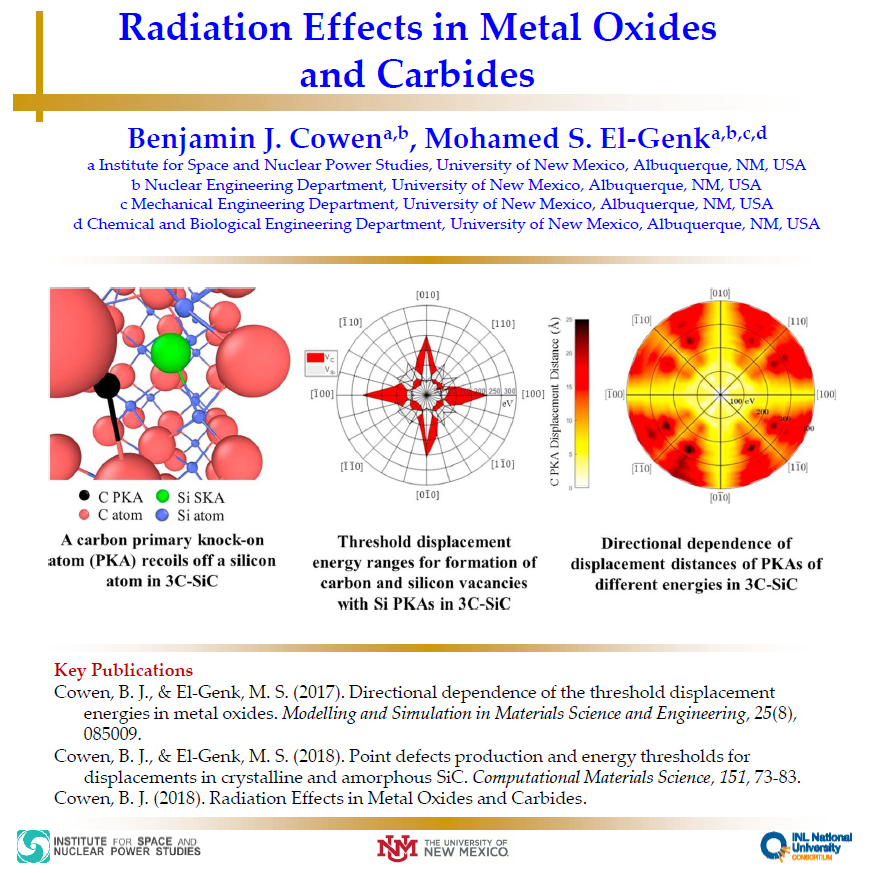
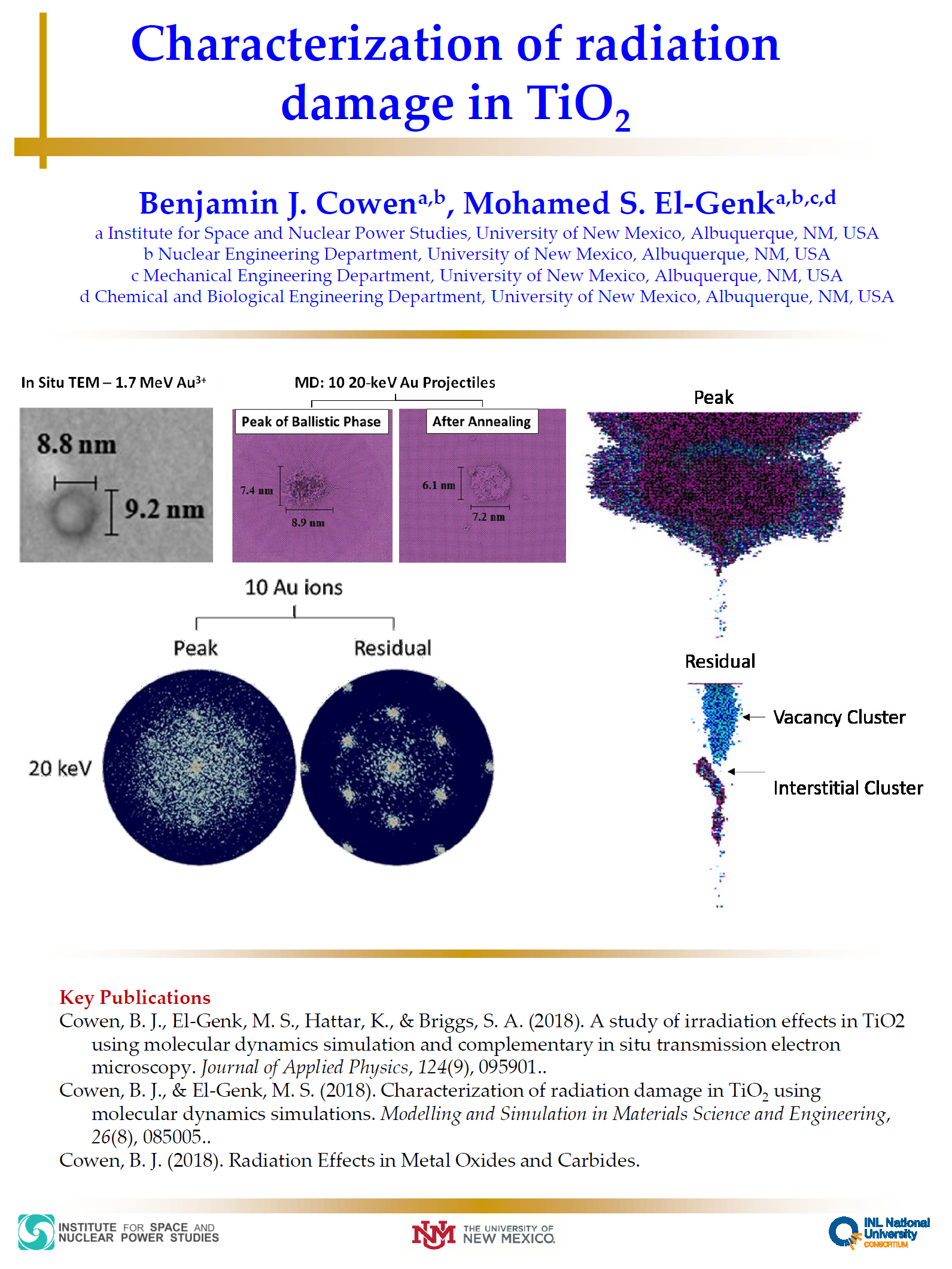
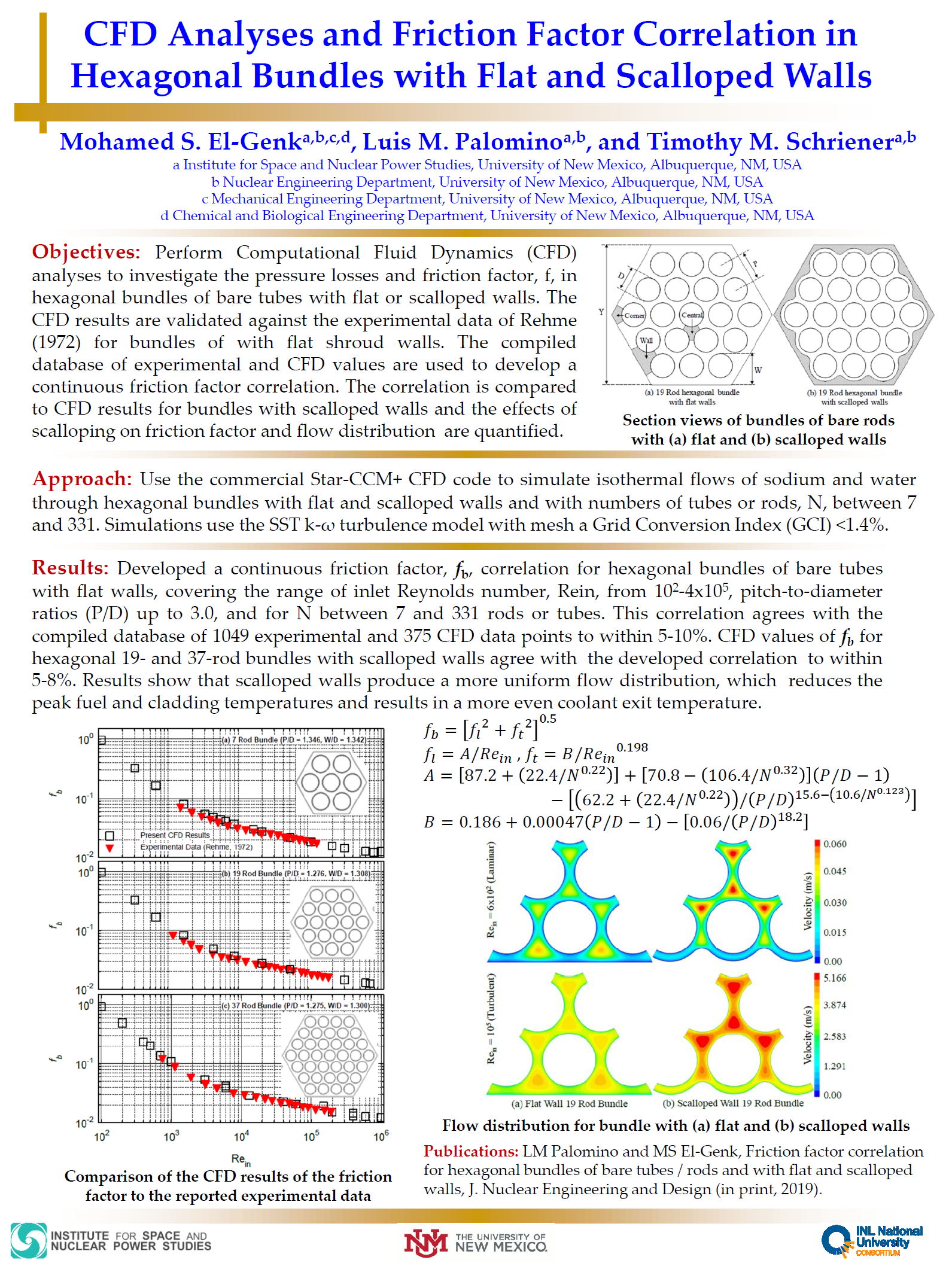
[03 - 29 - 2019] Ph.D. Dissertation Defense - Luis Palomino
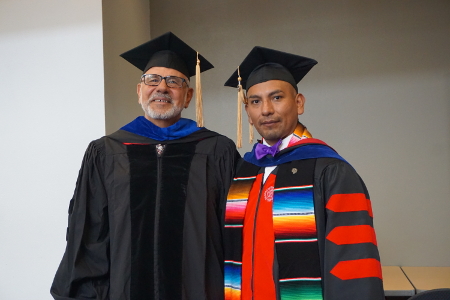
On March 29 2019, Luis Palomino successfully defended his Ph.D. Dissertation titled "Neutronic and CFD-Thermal Hydraulic Analyses Of Very-Small, Long-Life, Modular (VSLLIM) Reactor," and fulfilled all the requirements for the Ph.D. degree in Nuclear Engineering at the University of New Mexico. Luis's Dissertation Committee Chair and Faculty Advisor is Dr. Mohamed S. El-Genk, Distinguished and Regents' Professor of Nuclear, Mechanical, and Chemical and Biological Engineering and Founding Director of the Institute for Space and Nuclear Power Studies. Other members of the Dissertation Committee are Dr. Anil Prinja, Distinguished Professor and Chair of Nuclear Engineering, Dr. Timothy Schriener, Research Assistant Professor of Nuclear Engineering, and Dr. Fernando Garzon, Professor of Chemical and Biological Engineering. The dissertation research conducted neutronic and thermal-hydraulics analyses to investigate and quantify the passive operation and safety features of the Very-Small, Long-LIfe, and Modular (VSLLIM) nuclear reactor being developed at the Institute for Space and Nuclear Power Studies. The performed neutronics and fissile depletion analyses of the VSLLIM reactor using MCNP6 particle transport code confirmed that UN fuel enrichment of 13.76% is sufficient for achieving the hot-clean excess reactivity for operating VSLLIM reactor without refueling for ~92 and 5.8 full power years (FPY) at 1.0 and 10 MWth, respectively. The performed CFD-thermal-hydraulics analyses investigated the effects using metal fins along the outer surface of the guard vessel wall and changing the width of the cold air intake duct on the decay heat removal rate and the time after shutdown for cooling the in-vessel liquid sodium to 400 K. This research also performed CFD analyses to investigate the friction factor for laminar, transition, and turbulent flows in bare tube hexagonal bundles with flat and scalloped walls. The results of the CFD simulations and reported experimental data were used to develop a continuous correlation of the friction factor for bundles with flat walls with various numbers of tubes (7, 19, 37, and 61) in a triangular lattice with 1.07 < P/D < 2.416. The results also validated the applicability of the developed friction factor correlation to the VSLLIM reactor hexagonal bundles with scalloped walls. For more details and related publications, visit SLIMM Reactor Concept
[07 - 09 - 2018] New UNM-ISNPS DOE-NEUP Collaboration With Sandia National Laboratories
[06 - 20 - 2018] Mohamed El-Genk Promoted to Rank of Distinguished Professor
Mohamed S. El-Genk, Regents' Professor of nuclear engineering, mechanical engineering, and chemical and biological engineering and Founding Director of the Institute for Space and Nuclear Power Studies has been selected for the honor of being promoted to the rank of distinguished professor. UNM defines distinguished professors as those who have demonstrated outstanding achievements and are nationally and internationally renowned as scholars. This is the highest faculty title the university bestows, and only a handful of professors are honored with the rank each year.
[05 - 11 - 2017] El-Genk Receives 2017 ASME Heat Transfer Memorial Award
Mohamed S. El-Genk, Regents' Professor of Nuclear, Mechanical and Chemical & Biological Engineering and the founding Director of the Institute for Space and Nuclear Power Studies is selected to receive the American Society of Mechanical Engineers 2017 Heat Transfer Memorial Award. The award citation reads "for outstanding contributions to boiling enhancement; immersion cooling of electronics; forced, natural, and combined convection in rod bundles; heat pipes and thermosyphons; impinging and swirling jets heat transfer; thermal-hydraulics of nuclear reactors; and thermal management of space nuclear power systems." UNM Department of Nuclear Engineering Release
[11 - 10 - 2016] Patent awarded for UNM-ISNPS SLIMM Small Modular Reactor Concept
A US patent (Application US20160329113 A1) has been issued for UNM-ISNPS's SLIMM (Scalable LIquid Metal cooled small Modular) Reactor concept. SLIMM is a small modular reactor design cooled by the natural circulation of liquid sodium for thermal powers between 10-100 MWth with a long operation lifetime of ~66-6.3 full power years without refueling. The SLIMM concept has been under the development by UNM-ISNPS researchers for several years and has been the subject of many publications SLIMM Publications 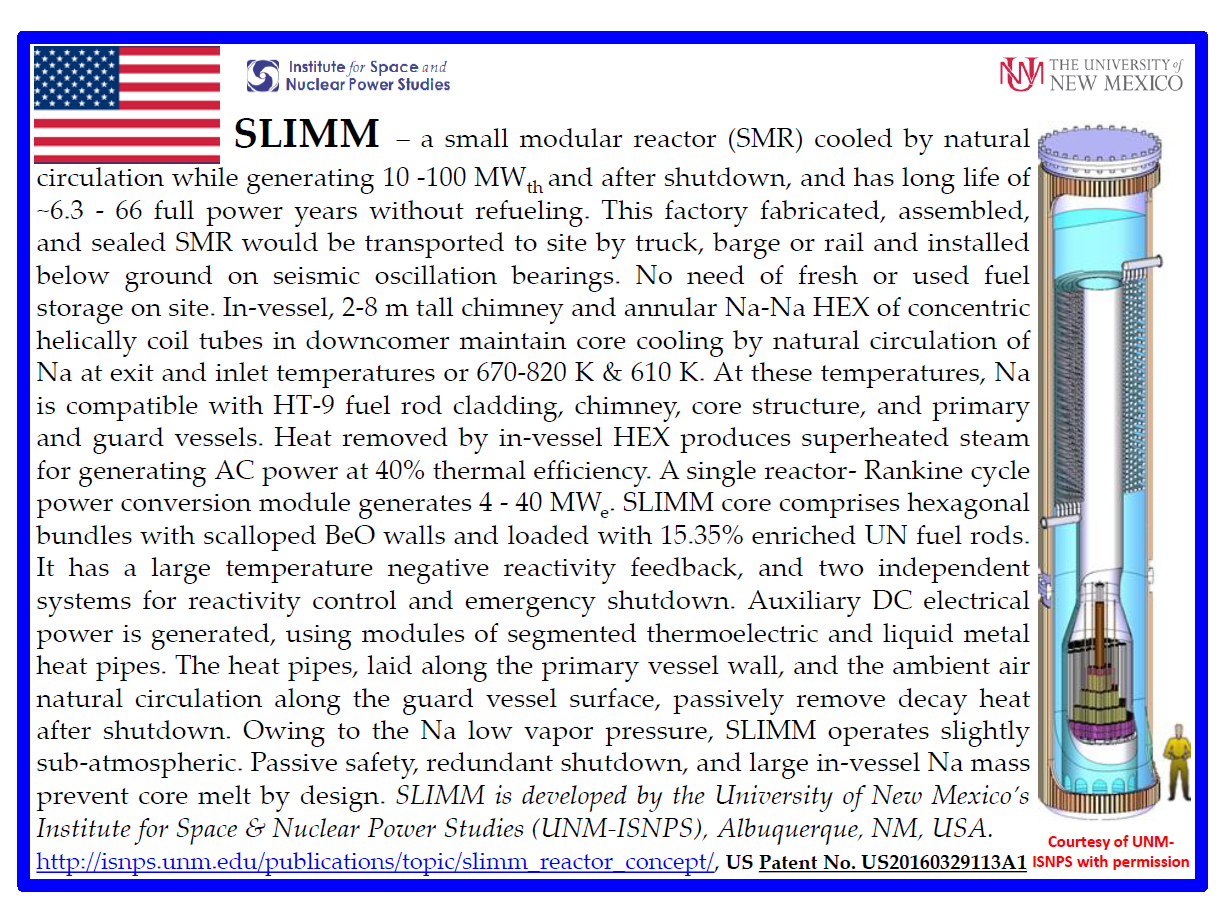
[12 - 17 - 2015] ISNPS Research Displayed at Supercomputing 2015 Conference
Recent research performed by ISNPS with the assistance of the high performance computers at the University of New Mexico's Center for Advanced Research Computing (CARC) was displayed by UNM CARC at the International Supercomputing 2015 conference. The highlighted research included involved projects on Molecular Dynamics Simulations of Force Fields for Modeling Crystalline SiO2 and Convection Heat Transfer of NaK-78 Liquid Metal in a Circular Tube and a Tri-lobe Channel. Copies of the research flyers are available below.
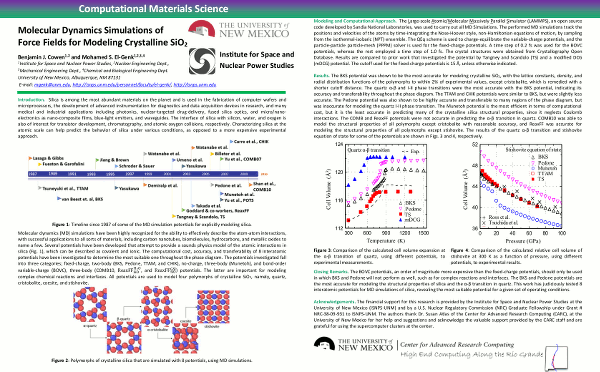
[09 - 23 - 2015] News Break- El-Genk is the Recipient of a National Technical Achievement Award

Mohamed S. El-Genk, Regents' Professor of Nuclear, Mechanical, and Chemical and Biological Engineering and the Founding Director of the Institute for Space and Nuclear Power Studies at UNM, is named the recipient of the American Nuclear Society thermal-hydraulics Technical Achievement Award for 2015. The award is "in recognition of his exceptional contributions to the understanding of terrestrial and space reactor thermal hydraulics phenomena and for his impact on the thermal hydraulics community as a researcher, educator, and leader." The award will be presented on Tuesday November 10, following the award lecture to be delivered by El-Genk entitled "Journey with Thermal-Hydraulics: Challenges, Contributions and Rewards," at the American Nuclear Society Annual Winter Meeting to be in Washington DC, 8-12, 2015. El-Genk is a nationally and international recognized expert and scholar with many seminal contributions to the technologies of space nuclear power and terrestrial nuclear reactors. He is a Fellow of the American Nuclear Society (ANS), American Society of Mechanical Engineers (ASME), the American Institute of Chemical Engineers (AIChE), and the International Association for the Advancement of Space Safety (IAASS) and an Associate Fellow of the American Institute for Aeronautics and Astronautics (AIAA). He is the recipient of many prestigious awards and recognitions, including the AIChE 2009/2010 Donald Q. Kern memorial award, for recognizing significant contributions in areas of applied heat and mass transfer, and the Heat Transfer and Energy Conversion Division Award. These are in addition to the Distinguished Faculty Member Honor, Alpha Nu Sigma Honor Society for Nuclear Science & Engineering of ANS, and the United States Department of Energy Certificate of Appreciation, for outstanding contributions to Space Nuclear Power and Propulsion. At UNM, El-Genk was named the UNM 46th Annual Research Lecturer, the recipient the Presidential UNM Lectureship Award, the Faculty Recognition Award, for having the greatest impact on graduating seniors in Nuclear Engineering, the School of Engineering's Research and Teaching Excellence Awards, the Graduate Students' Outstanding Teacher Award in Nuclear Engineering, and was named Regents' Professor. El-Genk is an Associate Editor of ASME Journal of Thermal Science and Engineering Applications, Editor of International Journal on Process Systems Engineering-Energy Systems Processes and member of editorial boards of ISRN Chemical Engineering, J. Nuclear Energy Science & Power Generation Technology and J. Frontiers in Heat Pipes Science and Technology. He is also a member of the Scientific Committee of the International Center of Heat and Mass Transfer and a US Delegate to the Assembly of the International Heat Transfer Conference.
[09 - 22 - 2015] News - New Mexico Governor Unveils New State Energy Plan that Includes Interest in Small Modular Reactors
Governor Susana Martinez has unveiled a new energy policy and implementation plan for the State of New Mexico calling for a broad approach embracing different energy sources including clean solar, wind, and nuclear energy. The plan, entitled "Seizing our Energy Potential: Creating a More Diverse Energy Economy in New Mexico" recommends developing a Small Modular Reactor (SMR) taskforce to support a pre-feasibility study for constructing an SMR prototype in New Mexico. For more details visit NM Energy, Mineral and Natural Resources Development . To learn more about ISNPS's research on SMRs visit Small Modular Reactors.
[09 - 21 - 2015] Ph.D. Dissertation Defense - Timothy M. Schriener

On 5 May 2015, Mr. Timothy M. Schriener successfully defended his Ph.D. Dissertation, "Multi-Physics Design and Analyses of Long Life Reactors for Lunar Outposts," and fulfilled all the requirements for the Ph.D. degree in Nuclear Engineering at the University of New Mexico. Timothy's Dissertation Committee Chair and Faculty Advisor is Dr. Mohamed S. El-Genk, Regents' Professor of Chemical and Biological, Nuclear, and Mechanical Engineering and Director of the Institute for Space and Nuclear Power Studies. Other members of the Dissertation Committee are Dr. Cassiano de Oliveira, Professor of Nuclear Engineering, Dr. Gary Cooper, Assistant Professor of Nuclear Engineering, Dr. Chris Hall, Professor of Mechanical Engineering, and Dr. Salvador Rodriguez of Sandia National Laboratory. The dissertation research investigates two lunar surface power reactor concepts using a multi-physics design and analyses methodology which couples detailed Monet Carlo neutronics simulations with 3-D Computational Fluid Mechanics (CFD) and thermal-hydraulics analyses. The research investigated examples of both a solid core reactor that would be fueled at launch, the Sectored Compact Reactor (SCoRe), and well as a concept which would be loaded with fuel on the Moon, the Pellet Bed Reactor (PeBR). Results showed that the final SCoRe concept could achieve a long operational life of 21 full power years, and that the sectored core allows the reactor to continue safe operation in the event one of the core sectors experiences a loss of coolant. Neutronics analyses show that the PeBR can achieve a operational life of 66 fuel power years by fueling the reactor core on the Moon. A fuel loading simulation demonstrates that the reactor can be successfully fueled in lunar gravity. In addition, post-operation storage analyses of the SCoRe and PeBR concepts show that the radioactivity in the fuel decays away to a sufficiently low level to allow for recovery within 300 years. This research is partially funded by United States Nuclear Regulatory Commission Graduate Research Fellowship Grant#NRC-38-09-931-MOI to the University of New Mexico and the Institute for Space and Nuclear Power Studies. For more details and related publications, visit Space Nuclear Power and Propulsion Systems and Planetary Surface Power Systems.
[09 - 21 - 2015] Ph.D. Dissertation Defense - Arthur Suszko

On 15 June 2015, Mr. Arthur Suszko successfully defended his Ph.D. Dissertation, "Enhancement of Nucleate Boiling on Rough and Dimpled Surfaces with Application to Composite Spreaders for Microprocessors Immersion Cooling," and fulfilled all the requirements for the Ph.D. degree in Mechanical Engineering at the University of New Mexico. Arthur's Dissertation Committee Chair and Faculty Advisor is Dr. Mohamed S. El-Genk, Regents' Professor of Chemical and Biological, Nuclear, and Mechanical Engineering and Director of the Institute for Space and Nuclear Power Studies. Other members of the Dissertation Committee are Dr. Yu-Lin Shen, Professor of Mechanical Engineering, Dr. Mehran Tehrani, Assistant Professor of Mechanical Engineering, and Dr. Mahmoud Taha, Professor of Civil, Mechanical, and Electrical and Computer Engineering. The dissertation research experimentally investigated the enhancement of pool nucleate boiling of PF-5060 dielectric liquid on uniformly heated, 10 x 10 x 1.6 mm rough and dimpled Cu surfaces at different inclination angles. In addition, the experimental nucleate boiling heat transfer coefficient curves for rough Cu surfaces were used to computationally investigate the performance of composite spreaders for high power microprocessors. The results demonstrated that composite heat spreaders with scalable surface modifications, such as surface roughening and dimples machining, are very promising for the immersion cooling of high powered microprocessors. For more details and related publications, visit Immersion Cooling of High-Power Electronics.
[04 - 02 - 2015] Master's Project Defense - Benjamin J. Cowen

On Thursday, 2 April 2015, Benjamin J. Cowen, a Research Assistant with the Institute for Space and Nuclear Power Studies, successfully defended his Master's Project in Nuclear Engineering. Project committee included Research Professor and Director of the Center for Advanced Research Computing (CARC), Susan Atlas, Professor and Interim Chair, Anil Prinja, and Project Chair and Advisor, Regents` Professor Mohamed S. El-Genk.
[11 - 20 - 2014] New Research Assistant positions available for 2014
The Institute for Space and Nuclear Power Studies has current openings starting spring, summer or fall semesters 2014, for qualified graduate students to purse PhD in Chemical, Mechanical or Nuclear Engineering at the University of New Mexico. More information is available here.
[08 - 14 - 2013] Ph.D. Dissertation Defense - Tai T. Pham

On 23 July 2013, Mr. Tai T. Pham successfully defended his Ph.D. Dissertation, "Simulations of Space Radiation Interactions with Materials, with Application to Dose Estimates for Lunar Shelter and Aboard the International Space station," and fulfilled all the requirements for the Ph.D. degree in Nuclear Engineering at the University of New Mexico. Tai's Dissertation Committee Chair and Faculty Advisor is Dr. Mohamed S. El-Genk, Regents' Professor of Chemical, Nuclear and Mechanical Engineering and Director of the Institute for Space and Nuclear Power Studies. Other members of the Dissertation Committee are Dr. Cassiano de Oliveira, Professor of Chemical and Nuclear Engineering, Dr. Adam Hecht, Assistant Professor of Chemical and Nuclear Engineering, and Dr. Christos Christodoulou, Professor of Electrical and Computer Engineering and Director of the Configurable Space Microsystems Innovations & Applications Center (COSMIAC). The Dissertation research provided valuable insights into the interaction of energetic space radiation with potential shielding materials and dose rate estimates for a Lunar Shelter with Regolith shielding during a simulated energetic solar event. In addition, simulation results of the dose rate estimates on board the International Space Station using MCNPX and PHITS codes agreed well with recent measurement using a spherical Phantom. Best results are when using a cylindrical source particles domain in the simulations. This research is partially funded by United States Nuclear Regulatory Commission Graduate Research Fellowship Grant#NRC-38-09-931-MOI to the University of New Mexico and the Institute for Space and Nuclear Power Studies. For more details and related publications, visit Shielding, Solar Energetic Particles and Radiation Detection.
[08 - 02 - 2013] Ph.D. Dissertation Defense - In-Hwan Yang
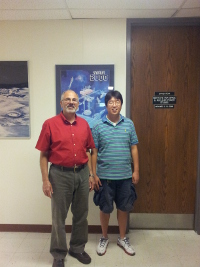
On 16 July 2013, In-Hwan Yang (right) successfully defended his Ph.D. Dissertation "Numerical Analysis of co-flowing immiscible liquids in co-axial microtubes," and have fulfilled all requirements for the Ph.D. degree in Chemical Engineering at the University of New Mexico. In-Hwan's Dissertation Committee Chair and Faculty Advisor is Dr. Mohamed S. El-Genk, Regents' Professor of Chemical, Nuclear and Mechanical Engineering (left). Other members of The Dissertation Committee are Dr. Timothy L. Ward, Department Chair and Professor of Chemical and Nuclear Engineering, Dr. Dimiter N. Petsev, Professor of Chemical and Nuclear Engineering, and Dr. Juan Carols Heinrich, Professor of Mechanical Engineering. The committee recommended Mr. Yang Dissertation for the PhD degree with Distinction. The Dissertation research numerically investigated various controlling parameters affecting emulsification of co-flowing immiscible liquid in co-axial microtubes. The research provided an extensive database for developing a flow regimes map and dimensionless correlations for predicting the boundaries between the prevailing regimes of dripping, transition and jetting as well as the diameter and frequency of forming disperse micro-droplets. The research results are successfully validated using reported experiments data for various combinations of co-flowing immiscible liquids. Results show that linear instability analysis consistently underestimates the boundary between transient and jetting. In-Hwan conducted his PhD research as a Research Assistant with the Institute for Space and Nuclear Power Studies, which funded the research. For more details and related publications, visit: Microemulation Simulation and Microchannel Flow, and Computational Fluid Dynamics and Numerical Analyses
[07 - 26 - 2013] Ph.D. Dissertation Defense - Amir F. Ali
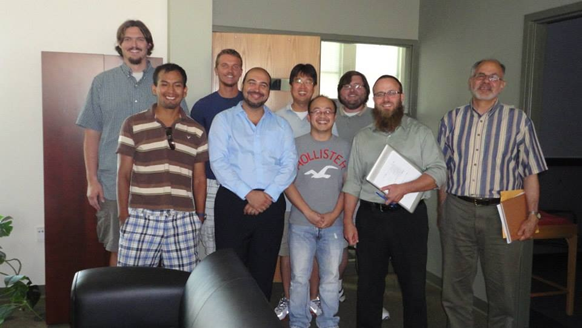
On 11 July 2013, Amir Faris Ali (front, 2nd left), successfully defended his PhD dissertation entitled "Enhancement of Saturation Boiling of PF-5060 Dielectric Liquid on MicroPorous Surfaces." Mr. Ali is a Research Assistant with the Institute for Space and Nuclear Power Studies (ISNPS), which funded his research. Faculty advisor and Chair of the Dissertation Committee is Dr. Mohamed S. El-Genk, Regents' Professor of Chemical, Nuclear and Mechanical Engineering and Director of ISNPS ((Front, 1st to the right)). Other members of Amir's dissertation committee are Dr. Timothy L. Ward, Professor and Chair of Chemical and Nuclear Engineering Department, Dr. Juan Heinrich, Professor of Mechanical Engineering, and Dr. Zayd Leseman, Associate Professor of Mechanical Engineering (front, 2nd right). Mr. Ali is accompanied in this photo with fellow researchers at INSPS, in celebration of his accomplishment and this important milestone. The Dissertation research experimentally investigated enhancing nucleate boiling and Critical Heat Flux (CHF) of PF-5060 dielectric liquid on microporous copper (MPC) surfaces at different inclination angles. In addition, 3D numerical analysis quantified and the potential of MPC surfaces for immersion cooling of high power computer chips. For more details about this research and others please visit the ISNPS projects webpage.
[02 - 01 - 2013] Important Notice - Research Assistantships
A number of Research Assistantship positions will be available for qualified graduate students to pursue a PhD in Nuclear, Chemical or Mechanical Engineering. We are looking of outstanding candidates with demonstrated experience in one or more of the following areas:
- Computational Fluid Dynamics (CFD) and simulation of complex fluids;
- Thermal Sciences, advanced cooling, and thermal management of space systems;
- Nucleate boiling enhancement and two-phase flow in macro channels;
- Experimental methods and advanced instrumentation;
- Microfluidics and gas adsorption experiments and techniques;
- Electrochemical deposition and synthesis of Nano- and micro-porous surfaces;
- Nuclear fuel, reactor materials, and corrosion and blistering solutions;
- Nuclear graphite irradiation and gasification kinetics;
- Space Nuclear Power;
- Dynamic simulation of energy systems;
- Neutronics and reactors thermal-hydraulics and safety analyses;
- Small modular reactors;
- Dry casks for interim storage in dry casks;
United States citizens are strongly encouraged to apply, but strong and experienced international students will also be considered. Those interested please send a letter of interest, C.V., copies of recent publications, names and contact information for three references as email attachments to: mgenk@unm.edu.
[11 - 26 - 2012] Breaking News - Boyce W. Travis successfully defended his Master's Thesis, titled "An Effective Methodology For Thermal- Hydraulics Analysis Of A VHTR Core And Fuel Elements."
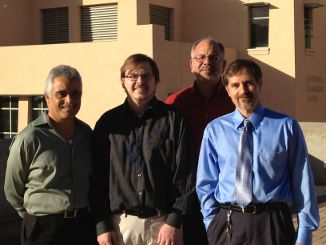
On Monday, 26 November 2012, Boyce W. Travis (middle front), a Research Assistant with the Institute for Space and Nuclear Power Studies, successfully defended his Master's Thesis in Nuclear Engineering. Thesis committee included Research Assistant Professor Jean-Michel Tournier (front right), Adjunct Associate Professor Sal Rodriguez (front left), and Committee Chair and Thesis Advisor, Regents` Professor Mohamed S. El-Genk.
Click here for the full article
[04 - 24 - 2010] Two Nuclear Engineering Senior Design Teams Receive National Awards at American Nuclear Society National Student Conference
Every spring, the seniors of the Nuclear Engineering Department at the University of New Mexico are divided into groups to work on a senior capstone design project, under the guidance of Regentsí Professor Mohamed El-Genk. The students in the senior design class are encouraged to submit papers based on their design projects for presentation at the American Nuclear Society Annual Student Conference. This year, the conference was held at the University of Wisconsin, Madison, WI, 30 March - 2 April, 2016. At the conference, UNM was represented by five design teams, constituting the entire NE senior class.
The five UNM senior designs presented at the conference are of Americian-241 Radioisotope Thermoelectric Generator (RTG) for future space exploration, a research nuclear reactor for the production of Molybnium-99 medical isotope, a small modular, liquid sodium cooled nuclear reactor for electricity generation and process heat to remote communities, a small nuclear reactor system for maritime electrical power and propulsion, and a nuclear reactor power system for a submersible research vessel. All five projects were accepted for presentations by the conference committee, four were selected for technical podium presentations, and one for a poster presentation.
Two of the UNM design teams received best presentation awards in their technical tracks. The members of the first team, Arnika Chidambaram, Joey Elmblad, James Pike, and Ryan Sharp are developing a Low Enriched High-Flux nuclear Reactor for the production Molybdenum-99 medical isotope. Chidambaram and Pike represented their team at the conference and received the best presentation award in the Isotopes and Radiation Technical track. The members of the second ranked UNM team, Zackary Dodson, Cole Mueller, and Brittany Umbrage are developing an 241Am2O3 Coated Particle, 100 We RTG for Long-Life Planetary and Space Missions. Dodson and Umbrage represented their design team at the conference and received the best presentation awards in the Aerospace Nuclear Science and Technology Technical track. In addition, Dodson and Umbrage received an invitation and offered stipend to attend and present their team design at the Innovations in Nuclear Space Conference, to be held February 2017, in Orlando, FL. [PDF of Press Release]
[12 - 01 - 2008] Chemical and Nuclear Engineering Student Defends Master's Thesis
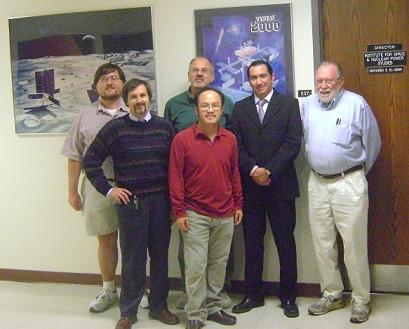
Mr. Bruno Martin Gallo, Research Assistant with the Institute for space and Nuclear Power Studies, successfully defended his Master Thesis entitled"Brayton Rotating Unit designs and Analyses for Space Reactor Power Systems." The Thesis committee includes Professor Norm Rodrick, Professor Jean-Michel Tournier, and Regents' Professor Mohamed El-Genk (Chair), at the department of Chemical and Nuclear Engineering. Mr. Gallo is graduating with an MS degree in Nuclear Engineering. He will return to his native country Argentina to sort through a number of exciting job offers. On behalf of the ISNPS's family and the Department of Chemical and Nuclear Engineering we wish Bruno the best for the Holidays and offer him our warm congratulations for such outstanding accomplishment.
The photo shows Mr. Gallo with the members of Thesis committee and his friends and fellow graduate students, Timothy M. Schriener and Tai Pham. Tim and Tia are Ph.D. Candidates in Nuclear Engineering currently working on their Dissertations with Professor El-Genk at ISNPS.
[05 - 08 - 2008] Two Chemical and Nuclear Engineering Students Successfully Defend their PhD Disertation and Masters Thesis
Jack L. Parker successfully defended his Ph.D. dissertation entitled "Boiling of Dielectric Liquids on Porous Graphite and Extended Copper Surfaces," and will graduate in a couple of weeks with a Ph.D. from the Department of Chemical and Nuclear Engineering at University of New Mexico (UNM). Jack is a Research Assistant with the Institute for Space and Nuclear Power Studies (ISNPS) which partially funded his Ph.D. research with the support of a DOE graduate fellowship. Jack's Ph.D. Faculty advisor is Dr. Mohamed S. El-Genk, Regents' Professor of Chemical, Nuclear and Mechanical Engineering and Director of UNM-ISNPS. Other members of Jack's dissertation committee are Dr. Timothy L. Ward, Professor of Chemical and Nuclear Engineering, Dr. Dimiter Petsev, Associate Professor of Chemical and Nuclear Engineering, and Dr. Arsalan Razani, Professor of Mechanical Engineering. Several refereed journal articles and full papers in conference proceedings, based on the results of Jack's dissertation research, have been published. For listings visit: research listings.
Devin W. Gray successfully defended his Masters Thesis entitled "An Investigation of Gas Bubble Injection from Single Nozzles into Water and Liquid Metal Pools," and will graduate in a couple of weeks with an M.S. from the Department of Chemical and Nuclear Engineering at University of New Mexico (UNM). Devin is a member of the technical staff at Los Alamos National Laboratory and his thesis faculty advisor is Dr. Mohamed S. El-Genk, Regents' Professor of Chemical, Nuclear and Mechanical Engineering and Director of UNM-ISNPS. Other members of Devinís thesis committee are Dr. Timothy L. Ward, Professor of Chemical and Nuclear Engineering, and Dr. Gary W. Cooper, Associate Professor of Chemical and Nuclear Engineering.
[04 - 09 - 2008] New Fellow of the International Association for the Advancement of Space Safety (IAASS)
Mohamed S. El-Genk, Regents' Professor of Chemical, Nuclear, and Mechanical Engineering and the founding Director of the Institute for Space and Nuclear Power Studies at the University of New Mexico has been elected Fellow of the International Association for the Advancement of Space Safety (IAASS).
IAASS is a non-profit organization dedicated to furthering international cooperation and scientific advancement in the field of space systems safety and it is a member of the International Astronautical Federation (IAF).
Dr. El-Genk is also a Fellow of the American Nuclear Society (ANS), the American Society of Mechanical Engineers (ASME), and the American Institute of Chemical Engineers (AIChE), and an Associate Fellow of the American Institute for Aeronautics and Astronautics (AIAA). He is serving on the IASS Academic Committee to develop international education and training programs in collaboration with other universities in US and abroad in the areas of space power and propulsion technologies and the advancement of Space Safety, and is also a member of the program committee of the IAASS Conference "Building a Safer Space Together" to be held in Rome, Italy, October 21-23, 2008. [ Link ]
[01 - 10 - 2008] 2008: A year of celebrations
2008 marks the 50th anniversary of NASA. Established on July 29, 1958 by the National Aeronautics and Space Act, NASA is responsible for the nation's public space program as well as long-term civilian and military aerospace research. The Institute of Space and Nuclear Power Studies would like to congratulate NASA on 50 years of pioneering space exploration. The Institute's own Space Technology and Applications International Forum, or STAIF as it is more commonly known, is also celebrating its 25th year in 2008.




